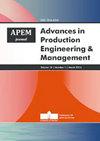Awareness and readiness of Industry 4.0: The case of Turkish manufacturing industry
IF 2.8
3区 工程技术
Q2 ENGINEERING, MANUFACTURING
引用次数: 31
Abstract
The concept Industry 4.0 (I4.0) represents intelligent production processes combining cyber and physical systems through a set of technologies such as internet of things, big data and cloud computing. Transition to Industry 4.0 is expected to cause formidable structural changes, productivity increments and competitiveness in manufacturing industry in all over the world. This study aimed to investigate the general approach to the concept of Industry 4.0 and levels of adoption of the basic Industry 4.0 technologies in manufacturing firms across Turkey. For this purpose, a survey was conducted with 427 firms with various sizes (micro, small, medium and large) operating in six subsectors (automotive; electronic; machinery; chemical; food; and textile) of Turkish manufacturing. The paper examined nine I4.0 technologies: autonomous robots, big data applications, cloud computing, cyber security, simulation approaches, additive manufacturing, system integration, internet of things, and augmented reality. The results revealed that, there is a significant correlation between the degrees of importance and implementation of the basic Industry 4.0 technologies. Moreover, I4.0 implementation degree increases as the firm size increases. The top three industries in Turkish manufacturing that use the most basic Industry 4.0 technologies are automotive industry, electrical and electronics, and machinery, respectively. The analyses are aimed to achieve a better understanding of the concept Industry 4.0 by comparing different groups of manufacturers. © 2020 CPE, University of Maribor. All rights reserved.工业4.0的意识和准备:土耳其制造业的案例
工业4.0 (I4.0)的概念是通过物联网、大数据和云计算等一系列技术,将网络和物理系统结合起来的智能生产过程。向工业4.0的过渡预计将在全球范围内引起巨大的结构变化,生产力提高和制造业竞争力。本研究旨在调查工业4.0概念的一般方法以及土耳其制造企业采用基本工业4.0技术的水平。为此目的,对427家不同规模(微型、小型、中型和大型)的公司进行了一项调查,这些公司在六个分部门(汽车;电子;机械设备;化学;食物;和纺织品)的土耳其制造业。该报告研究了9项工业4.0技术:自主机器人、大数据应用、云计算、网络安全、仿真方法、增材制造、系统集成、物联网和增强现实。结果表明,工业4.0基础技术的重要性与实施程度之间存在显著的相关关系。而且,工业4.0的实施程度随着企业规模的增加而增加。土耳其制造业中使用最基本工业4.0技术的前三大行业分别是汽车工业、电气和电子以及机械。这些分析的目的是通过比较不同的制造商群体来更好地理解工业4.0的概念。©2020 CPE,马里博尔大学。版权所有。
本文章由计算机程序翻译,如有差异,请以英文原文为准。
求助全文
约1分钟内获得全文
求助全文
来源期刊

Advances in Production Engineering & Management
ENGINEERING, MANUFACTURINGMATERIALS SCIENC-MATERIALS SCIENCE, MULTIDISCIPLINARY
CiteScore
5.90
自引率
22.20%
发文量
19
期刊介绍:
Advances in Production Engineering & Management (APEM journal) is an interdisciplinary international academic journal published quarterly. The main goal of the APEM journal is to present original, high quality, theoretical and application-oriented research developments in all areas of production engineering and production management to a broad audience of academics and practitioners. In order to bridge the gap between theory and practice, applications based on advanced theory and case studies are particularly welcome. For theoretical papers, their originality and research contributions are the main factors in the evaluation process. General approaches, formalisms, algorithms or techniques should be illustrated with significant applications that demonstrate their applicability to real-world problems. Please note the APEM journal is not intended especially for studying problems in the finance, economics, business, and bank sectors even though the methodology in the paper is quality/project management oriented. Therefore, the papers should include a substantial level of engineering issues in the field of manufacturing engineering.
 求助内容:
求助内容: 应助结果提醒方式:
应助结果提醒方式:


